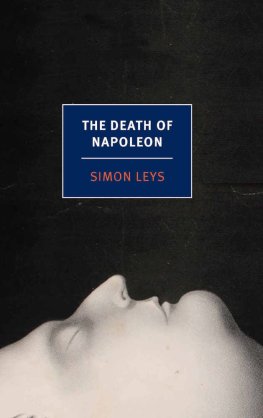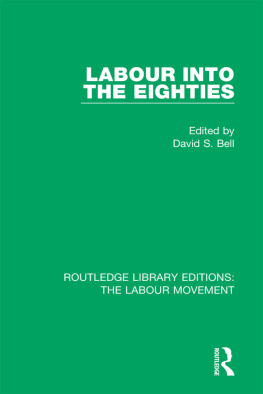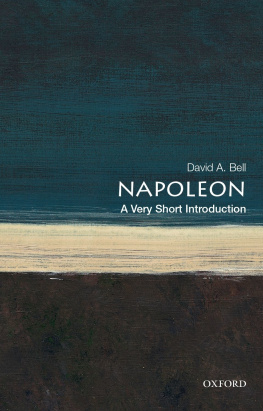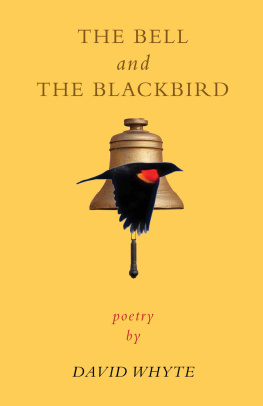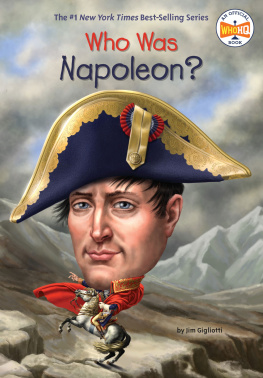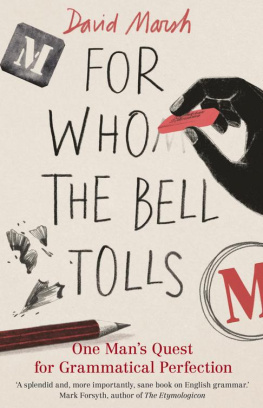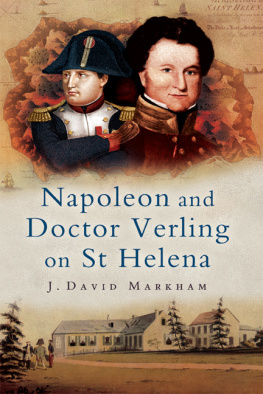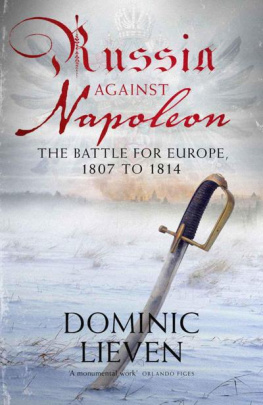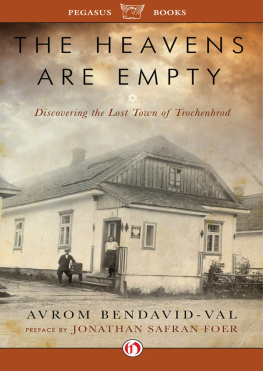David Avrom Bell - The first total war : Napoleon’s Europe and the birth of warfare as we know it
Here you can read online David Avrom Bell - The first total war : Napoleon’s Europe and the birth of warfare as we know it full text of the book (entire story) in english for free. Download pdf and epub, get meaning, cover and reviews about this ebook. year: 2008, publisher: Houghton Mifflin Harcourt, genre: Politics. Description of the work, (preface) as well as reviews are available. Best literature library LitArk.com created for fans of good reading and offers a wide selection of genres:
Romance novel
Science fiction
Adventure
Detective
Science
History
Home and family
Prose
Art
Politics
Computer
Non-fiction
Religion
Business
Children
Humor
Choose a favorite category and find really read worthwhile books. Enjoy immersion in the world of imagination, feel the emotions of the characters or learn something new for yourself, make an fascinating discovery.

- Book:The first total war : Napoleon’s Europe and the birth of warfare as we know it
- Author:
- Publisher:Houghton Mifflin Harcourt
- Genre:
- Year:2008
- Rating:4 / 5
- Favourites:Add to favourites
- Your mark:
- 80
- 1
- 2
- 3
- 4
- 5
The first total war : Napoleon’s Europe and the birth of warfare as we know it: summary, description and annotation
We offer to read an annotation, description, summary or preface (depends on what the author of the book "The first total war : Napoleon’s Europe and the birth of warfare as we know it" wrote himself). If you haven't found the necessary information about the book — write in the comments, we will try to find it.
David Avrom Bell: author's other books
Who wrote The first total war : Napoleon’s Europe and the birth of warfare as we know it? Find out the surname, the name of the author of the book and a list of all author's works by series.
The first total war : Napoleon’s Europe and the birth of warfare as we know it — read online for free the complete book (whole text) full work
Below is the text of the book, divided by pages. System saving the place of the last page read, allows you to conveniently read the book "The first total war : Napoleon’s Europe and the birth of warfare as we know it" online for free, without having to search again every time where you left off. Put a bookmark, and you can go to the page where you finished reading at any time.
Font size:
Interval:
Bookmark:

Copyright 2007 by David A. Bell
All rights reserved
For information about permission to reproduce selections from this book, write to Permissions, Houghton Mifflin Harcourt Publishing Company, 215 Park Avenue South, New York, New York 10003.
www.hmhco.com
The Library of Congress has cataloged the print edition as follows:
Bell, David Avrom.
The first total war : Napoleons Europe and the birth of
warfare as we know it / David A. Bell.
p. cm.
Includes bibliographical references and index.
ISBN -13: 978-0-618-34965-4
ISBN -10: 0-618-34965-0
1. Napoleon I, Emperor of the French, 17691821Military leadership. 2. Napoleonic Wars, 1800-1815. 3. FranceHistory, Military1789-1815. 4. EuropeHistory, Military1789-1815. 5. Military history, Modern. 6. War and societyHistory. I. Title.
DC 202.1. B 39 2007
940.27dc22 2006023077
e ISBN 978-0-547-52529-7
v1.0514
To Elana Kathleen Bell and Joseph Nathaniel Bell
T O GIVE ADEQUATE THANKS to everyone who helped me with this project would probably take the equivalent of an additional chapter. I doubt that my editor would approve, even though several pages would go to singing her praises. But I do want to acknowledge my most important debts.
The idea for the project first gelled in a memorable conversation with Darrin McMahon in the spring of 2000. My agent, Elyse Cheney, encouraged me to write a book for a general audience and gave me invaluable assistance throughout.
The American Council of Learned Societies Frederick Burkhardt Residential Fellowship Program for Recently Tenured Scholars and the John Simon Guggenheim Memorial Foundation generously granted me fellowships, and the Johns Hopkins University not only allowed me to take two years leave but also provided additional financial assistance. At Hopkins, I am grateful to Deans Daniel Weiss and Adam Falk and to two chairs and friends, Gabrielle Spiegel and Richard Kagan, for their incredibly generous support. Over the years, I have benefited in too many ways to mention from the wonderful atmosphere provided at Johns Hopkins by my colleagues, graduate students, and the History Department staff. My students Jason Kuznicki and Mary Ashburn-Miller tracked down stray items in Paris for me. Rebecca Pekron and Jeremy Caradonna provided invaluable assistance with the books illustrations and Katie Jorgensen-Gray with editing.
Away from Baltimore, Leon Wieseltier at the New Republic and Paul Laity at the London Review of Books kindly kept sending me books about Napoleon and the French Revolution to review, gave me a chance to try out some of my ideas in print, and provided expert editing. I received helpful bibliographical suggestions from David Armitage and Sophia Rosenfeld. Dena Goodman did me a great favor by prodding me to think about the phenomenon of soldier-poets.
I inflicted draft chapters and articles on Mary Ashburn-Miller, Doron Ben-Atar, Claire Cage, Jane Dailey, Dan Edelstein, Eddie Kolla, Darrin McMahon, David Nirenberg, John Pocock, Eran Shalev, Donald Sutherland, Dror Wahrman, and David Woodworth and the whole manuscript on Rafe Blaufarb, Michael Broers, and Steven Englund. I am grateful for all the resulting corrections, suggestions, and criticisms, which in some cases forced me to rethink critical aspects of the project. I am also grateful to the audiences to which I presented portions of the work at Berkeley, the United States Naval Academy, the Sorbonne conference La Rvolution loeuvre, Rice University, the Johns Hopkins conference Napoleon and His Legend, the University of Delaware, Florida State University, George Mason University, the Yale conference Napoleons Legacies, the Baltimore-Washington Old Regime France Group, the Consortium on the Revolutionary Era, the University of Buffalo, the University of Chicago, New York University, Johns Hopkins University, the Indiana University Eighteenth-Century Seminar, and my spring 2006 graduate seminar. I have a particular debt to audiences at the cole Normale Suprieure de la rue dUlm, where I spent a highly stimulating month in 2005, and to my generous and thoughtful host there, Antoine Lilti.
At Houghton Mifflin, I want to thank Amanda Cook for her brilliant editing, her toleration of delays, her support, and her good cheer. Thanks as well to her assistant Will Vincent and to manuscript editor Beth Burleigh Fuller.
To my parents, Daniel and Pearl Kazin Bell, I am profoundly grateful, as always. The way my father cared for my mother during the years I wrote this book means more to me than I can say. Unlike many of the stories I tell here, it is a case of true heroism.
To my wife, Donna Lynn Farber, I owe, well, everything. She and our children, Elana and Joseph Bell, have made these years unreasonably happy ones for me. The book is dedicated to Elana and Joseph, with the hope that its subject will remain forever academic to them. Ldor va-dor.
This war will be the last war.
CHARLES-FRANOIS DUMOURIEZ , 1792
T HE YEARS 89 AND 90 were years of elation and hope. A powerful and much-loathed regime not only collapsed unexpectedly but did so with surprisingly little violence. Amid its ruins, a new international order seemed to be taking shape, built on a respect for peace, democracy, and human rights. So transformative did the moment appear that many advanced thinkers predicted nothing less than the coming end of warfare. But disillusion followed with cruel speed. The years that followed brought not peace but unremitting violence, which the dominant powers found frustratingly difficult to contain. Soon, the widespread expectation of an end to war gave way to the equally widespread conviction that an era of apocalyptic conflict had begun. Indeed, it was widely argued that to defeat evil adversaries, war now needed to be waged on a sustained and massive scale, and with measures once condemned as barbaric.
The strange thing about this description is that it applies equally well to two different centuries. Most obviously for us, it applies to the period that began in 198990. Even before the rotten timbers of the Soviet Union finished crashing to the ground, prominent political scientists were claiming that an end to war was at hand. Some thought that the world had simply begun to outgrow large-scale conflict. Others believed that peace would follow the spread of democracy, since democracies supposedly do not fight one another. Francis Fukuyama, in a famous and unjustly mocked article, linked the end of war to the end of historyby which he meant an end to conflicts over the proper form of society.
Instead of an end to war, of course, there followed an intensification of conflict and danger: in the Gulf War, the wars in the Balkans, and then the global upheaval that began on September 11, 2001. In the wake of that days horrific terrorist attacks, U.S. president George W Bush began to describe the struggle between the West and its adversaries as one between the forces of freedom and the forces of evil. Prominent supporters of his administration likened it to World War II and warned that the very survival of the West hung in the balance. Some insisted that to prevail, the West would even have to flout established restraints on military behavior. Among ourselves, we keep the law but when we are operating in the jungle, we must also use the laws of the jungle, wrote the British diplomat Robert Cooper in an influential 2002 essay. Soon afterward, the United States and its allies began a preemptive war in Iraq, starting with an open attempt to assassinate its head of state. Since then, American military operations have involved a number of well-publicized lapses into the laws of the jungle. At this writing, it is difficult to see how or when the current period of violent instability and danger might come to an end.
Next pageFont size:
Interval:
Bookmark:
Similar books «The first total war : Napoleon’s Europe and the birth of warfare as we know it»
Look at similar books to The first total war : Napoleon’s Europe and the birth of warfare as we know it. We have selected literature similar in name and meaning in the hope of providing readers with more options to find new, interesting, not yet read works.
Discussion, reviews of the book The first total war : Napoleon’s Europe and the birth of warfare as we know it and just readers' own opinions. Leave your comments, write what you think about the work, its meaning or the main characters. Specify what exactly you liked and what you didn't like, and why you think so.

